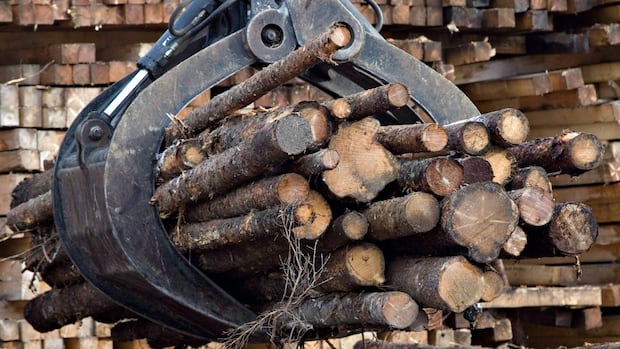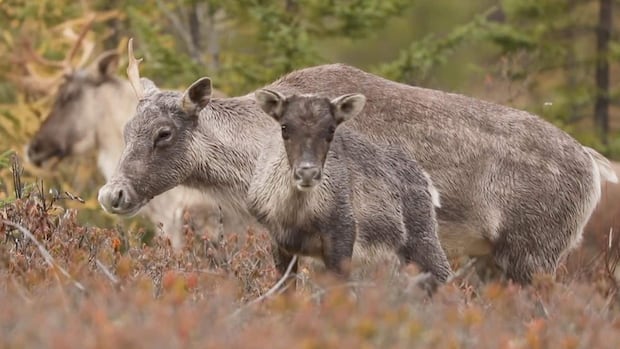Quebec’s boreal forest — twice the size of France — is a vast expanse of wilderness rich in biodiversity that can lock up huge amounts of climate-warming carbon dioxide.
It is also an economic driver for dozens of small communities.
With plant closures, job losses and the looming possibility of U.S. tariffs, Quebec’s forestry sector is under strain — and the province is trying to make changes to support it.
But Indigenous leaders and environmental groups worry Quebec’s planned reforms would give logging companies too much power over what areas are allowed to be cut.
Officials from the province’s Ministry of Natural Resources and Forests met with stakeholders, including First Nations groups, environmental groups and industry groups, behind closed doors this fall to discuss the proposed changes.
Participants were asked to sign a non-disclosure agreement before being shown details of the plan. Several First Nations groups refused to sign the document, and 20 leaders went public with their concerns.
“Quebec has to be transparent about what their real intentions are,” Ghislain Picard, the chief of the Assembly of First Nations Quebec-Labrador, told Quebec AM.
“To us, it seems very clear in light of all the information that we have, that the industry seems to be prevailing in what Quebec is trying to do.”
Casey Ratt, chief of the Algonquins of Barriere Lake, also known as the Mitchikanibikok Inik First Nation, told CBC News his community still lives with the damage caused by previous forestry activity.
“Elders go out into the territory and they don’t recognize it anymore,” Ratt said in an interview. His First Nation has a long history of fighting against clear-cutting logging in its territory, and reached a deal in 2018 with the Quebec government to consult before exploiting their traditional land.
“Enough is enough,” Ratt said. “Anybody that comes into our territory — they will be asked to leave.”
‘Science should be at the centre’
The Quebec government has faced accusations of working too closely with the logging industry in the past. Last week, the environmental group SNAP Quebec called for an independent investigation into the ties between the Ministry of Natural Resources and Forests and the industry.
SNAP Quebec was among those that met with the ministry and agreed to a non-disclosure agreement, said Pier-Olivier Boudreault, the group’s conservation director.
“We were not comfortable with this,” he said.
Boudreault said it appears the ministry has been ignoring scientific experts, as well as the broader goals of the provincial government — notably its commitment to conserving 30 per cent of its territory by 2030.
“It’s really crucial that science should be at the centre of forest management” as it aims to strike a balance between environmental and economic interests, Boudreault said.
Extensive boreal forest logging is putting increased pressure on already threatened woodland caribou. Much of the 14 million acres logged in Ontario and Quebec are old-growth forests the dwindling population needs to survive.
The plans are being developed as Quebec and Ottawa remain at odds over a plan to conserve caribou habitats.
Federal Environment Minister Steven Guilbeault has threatened to enact an emergency decree to protect dwindling caribou herds in Val-d’Or, Charlevoix and Pipmuacan, after he said the province failed to develop an adequate plan to save them.
A provincial commission estimated in 2022 that there were about 5,200 of the animals left in the province.
Earlier this year, a study examining nearly a half-century of logging in Quebec and Ontario warned that logging practices have left forests in the two provinces severely depleted, putting caribou at risk.
The research found that logging practices between 1976 and 2020 have resulted in the loss of more than 14 million hectares of forest and that only 21 million hectares of older forest (defined as forests 100 years or older) remained.
Martin-Hugues St-Laurent, an expert on caribou habitat at the Université du Québec à Rimouski, said the reforms will need to include greater protection of old-growth forests for caribou herds to have any hope of survival.
“To preserve caribou, we need to have patches of old-growth forests that are undisturbed,” said St-Laurent, a professor of animal ecology.
“The devil is in the details, so we don’t know exactly what will happen.”
St-Laurent has not been consulted by the province, nor have many of his colleagues at the Centre d’étude de la forêt, a renowned research organization, he said.
“There is no transparency,” he said, despite the fact that “Quebec forests are public” and the Quebec government is a “public organization.”

Plan coming in 2025
Quebec’s forestry sector accounts for more than 50,000 jobs and generates economic benefits in more than 900 municipalities. In all, forestry accounts for about 1.5 per cent of the province’s gross domestic product.
Jean-François Samray, president of the Conseil de l’industrie forestière du Québec, an industry group, told Radio-Canada the reforms will be crucial to ensuring the long-term survival of the sector while preserving “one of the best tools Quebec has to combat climate change.”

In a statement, Natural Resources and Forests Minister Maïté Blanchette Vézina said that, at this stage, the province is still meeting with various groups to test out ideas for the planned reforms.
She said the plan, expected in early 2025, will be developed in co-operation with Indigenous groups.
“We want to ensure that we have a dynamic forestry sector and that our forests are sustainable, and that’s exactly what I intend to do,” the statement said.



